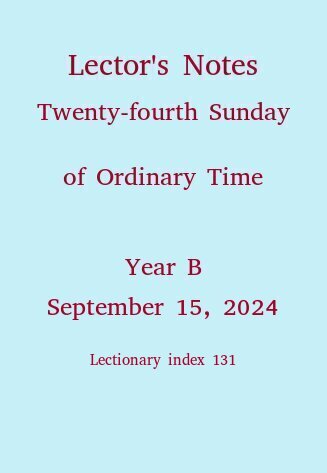

September 15, 2024, Twenty-fourth Sunday of Ordinary Time, Year B
The middle part of the book of the prophet Isaiah contains four poems that we now call the songs of the suffering servant. Here the prophet meditates on his sufferings and the price of fidelity to God. Jesus meditated on these passages; today they prepare us to hear Jesus' prediction of his passion.
In the early church, controversies were not as settled as they are now, and customs that we take for granted had yet to be established. Here the apostle James tries to resolve another early dispute.
In Saint Mark's gospel, Jesus is always concerned that his followers get the whole picture, including the inevitability of his passion, death and resurrection.
Our Liturgical Setting: Saint Mark records three times when Jesus predicted his passion, death and resurrection. Today's gospel, Mark 8:27-38 (NRSV translation, RCL), or Mark 8:27-35 (NAB translation, U.S. Catholic) or Jerusalem Bible translation is the first of those. This reading from Isaiah prepares us to hear that gospel.
The Literary and Theological Background: You won't be surprised when reminded that the Church uses this passage on Passion (Palm) Sunday, too. As we said in these Notes last Passion Sunday:
Last week we described the letter of James as practical and pastoral. Today James shows his polemical side. He was concerned about Christians living a selective faith, and perhaps spreading, if only by example, this weak version of the gospel. They seem to have concluded that as long as they believed the right teachings, they need do nothing. James has no patience with this notion, and your proclamation of his teaching should sound exasperated and emphatic.
Proclaiming James, Chapter 2: Here's a somewhat graphical guide to tones of voice to use in proclaiming the last sentence. Just like the words in italics here and the words in bold print contrast with the each other and their surrounding words, make them sound contrasting when you proclaim them:
Proclaiming James, Chapter 3: The text makes for complicated oral rendering because James uses the tongue as metaphor for all the troubles our speech can cause. Verses 3 and 4 and the latter half of verse 5 are about three different small things that govern greater wholes. It's not until verse 5a that the tongue is even mentioned, giving the metaphors their referent. So you'll have to say the tongue loudly in that sentence.
The expressions "world of iniquity" and "set on fire by hell" in verse 6 show how strongly James felt about this subject. Speak those phrases emphatically. Verses 7 and 8 develop yet another metaphor for the tongue's uncontrollable character. Recite the verses as a single sentence, contrasting what can be tamed with what no one can tame.
The last few verses express James' exasperation that we put our speech to contradictory purposes, and give us yet two more metaphors for that property of the tongue. You should ask those rhetorical questions with an indignant tone, like a debater demolishing an opponent's clearly weak argument.
A Little Ironic Self-Indulgence by the Author: As the husband of a public school teacher in the United States, I smiled at the notion that even in the first century C.E., teachers were held to higher standards. Was James the whipping boy of politicians in his day? Was he bedeviled by single-issue advocates on his board of education? Furthermore, my church's Lectionary skips these verses of James 3 (Perhaps we Catholics need a Sunday to make sure we quote the verses about good works that made Martin Luther suspicious of this letter). Now having reread Isaiah 50 while attuned to the teacher metaphor, I wonder if the Servant of the Lord was a beleaguered public school teacher, too. But let's set that aside, because all twelve verses of James 3 are really about controlling what we say, speech being the teacher's principal instrument.
After launching Lector's Notes in early 1999, I learned that the Notes had many Lutheran and Protestant readers. Those Christians use the Revised Common Lectionary (RCL), a schedule of readings in a three-year cycle that, on most Sundays, matches the Roman Lectionary.
It has always (since the 1970's) comforted me that Catholics, Lutherans and Protestants can share the same calendar of Scripture readings. The distinction of Lutherans from Protestants is a precision I learned from the late theologian, historian and ecumenist Allen O. Miller of Saint Louis, Missouri, USA, and the United Church of Christ.
Click here for answers to F.A.Q. about the R.C.L. The link atop that page called "YEARS" will take you to the R.C.L. text selections, Sunday by Sunday, online.
This page updated September 13, 2024